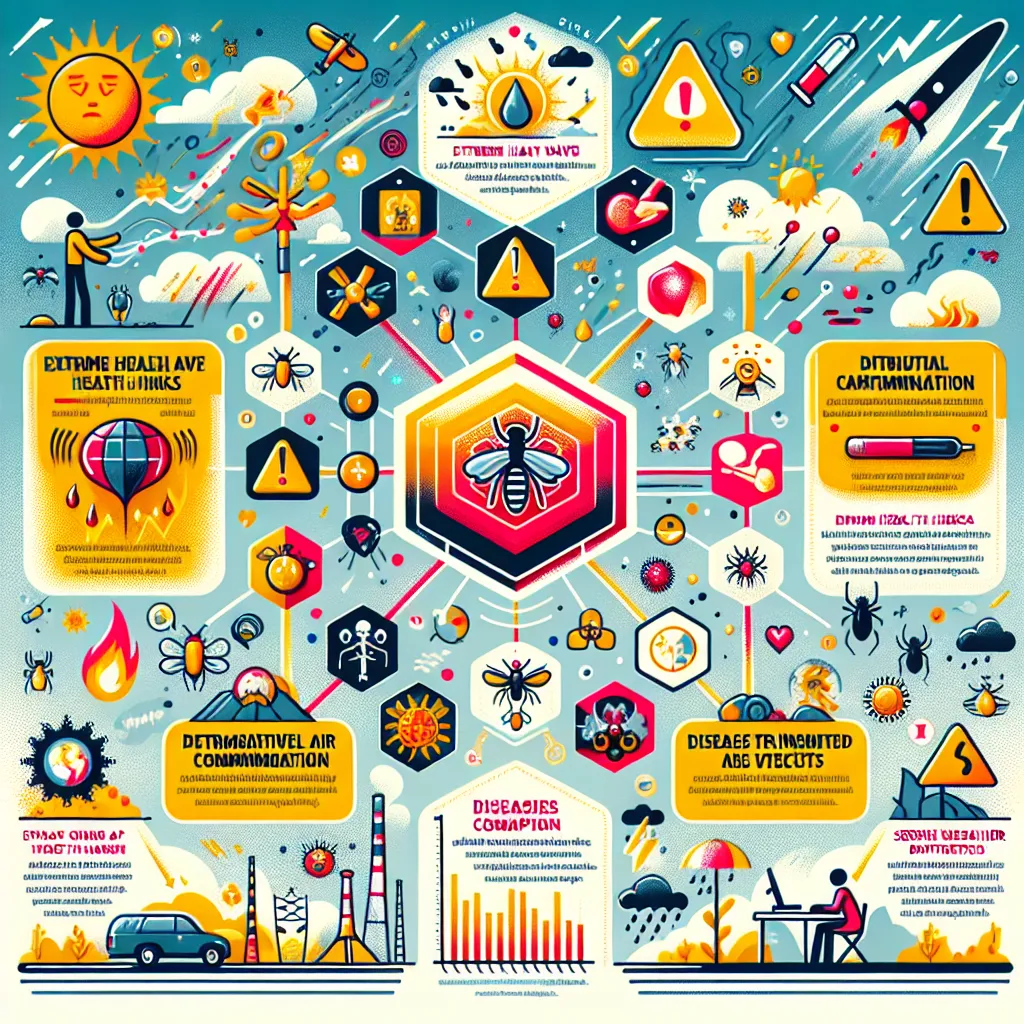Climate change and its effects on public health have become increasingly prevalent topics in IELTS Writing Task 2. Understanding this subject is crucial for test-takers aiming to achieve high band scores. In this article, we’ll explore a sample question, provide model essays for different band scores, and offer valuable insights to help you excel in your IELTS Writing Task 2.
Nội dung bài viết
Analyzing the Topic and Its Prevalence in IELTS
The impact of climate change on public health is a recurring theme in IELTS Writing Task 2. Its frequency can be attributed to its global relevance and the growing concerns surrounding environmental issues. Based on recent trends, we can expect this topic to continue appearing in future tests, making it essential for IELTS candidates to be well-prepared.
Let’s examine a sample question that closely resembles those found in actual IELTS tests:
Climate change is having an increasingly significant impact on public health worldwide. What are the main health risks associated with climate change, and what measures can governments and individuals take to address these issues?
Analyzing the Question
This question requires a two-part response:
- Identify the main health risks associated with climate change
- Discuss measures that both governments and individuals can take to address these issues
To achieve a high band score, you’ll need to provide a well-structured essay with clear examples and a balanced discussion of both parts of the question.
 Climate change health risks
Climate change health risks
Model Essays for Different Band Scores
Band 8-9 Essay
Climate change has emerged as a significant threat to global public health, with far-reaching consequences that demand immediate attention. This essay will explore the primary health risks associated with climate change and discuss potential measures that both governments and individuals can implement to mitigate these issues.
The main health risks stemming from climate change are numerous and diverse. Firstly, rising temperatures and more frequent heatwaves pose a severe threat to vulnerable populations, particularly the elderly and those with pre-existing health conditions. These extreme heat events can lead to heat exhaustion, heatstroke, and exacerbate cardiovascular and respiratory problems. Secondly, climate change is altering the distribution of vector-borne diseases such as malaria and dengue fever, expanding their reach into previously unaffected regions. Additionally, increased air pollution resulting from climate change can cause respiratory issues and worsen conditions like asthma and allergies. Furthermore, extreme weather events such as floods and hurricanes, which are becoming more frequent and intense due to climate change, can lead to injuries, displacement, and mental health problems.
To address these pressing issues, both governments and individuals must take decisive action. At the governmental level, implementing comprehensive policies to reduce greenhouse gas emissions is crucial. This can include investing in renewable energy sources, promoting sustainable transportation, and enforcing stricter regulations on industrial emissions. Governments should also strengthen healthcare systems to better respond to climate-related health emergencies and invest in research to develop adaptive strategies for managing emerging health threats. Moreover, public education campaigns can raise awareness about the health risks associated with climate change and promote preventive measures.
Individuals also play a vital role in mitigating the health impacts of climate change. By adopting more sustainable lifestyles, such as reducing energy consumption, using public transportation, and choosing plant-based diets, people can contribute to reducing overall greenhouse gas emissions. Additionally, individuals can take proactive steps to protect their health, such as staying informed about local air quality, using air purifiers in their homes, and being prepared for extreme weather events.
In conclusion, the health risks associated with climate change are substantial and diverse, ranging from direct impacts of extreme weather to the spread of infectious diseases. Addressing these challenges requires a coordinated effort from both governments and individuals, combining policy measures, healthcare system improvements, and personal lifestyle changes. By taking action now, we can work towards mitigating the adverse health effects of climate change and creating a more resilient and healthier future for all.
(Word count: 399)
Band 6-7 Essay
Climate change is becoming a big problem for people’s health all over the world. This essay will talk about the main health risks caused by climate change and what governments and people can do to help solve these problems.
There are several important health risks that come from climate change. First, higher temperatures and more heatwaves can be dangerous, especially for old people and those who are already sick. These hot days can cause heat exhaustion and make heart and breathing problems worse. Second, climate change is making some diseases spread to new places. For example, mosquitoes that carry diseases like malaria can now live in areas where it used to be too cold for them. Also, climate change is making air pollution worse in many places, which can cause breathing problems and make asthma more severe. Lastly, extreme weather like floods and storms, which are happening more often because of climate change, can hurt people and damage their homes.
To deal with these health problems, both governments and individuals need to take action. Governments should make laws to reduce pollution and greenhouse gases. They can do this by using more clean energy like solar and wind power, and by making cars and factories produce less pollution. Governments should also improve healthcare systems so they can better help people during climate-related health emergencies. They can also teach people about the health risks of climate change and how to stay safe.
Individuals can also help in many ways. People can reduce their own impact on the environment by using less energy at home, walking or using public transport instead of driving, and eating less meat. They can also protect their health by staying cool during hot days, using air purifiers at home if the air is polluted, and being prepared for extreme weather.
In conclusion, climate change is causing many health risks, from heat-related illnesses to the spread of diseases. To address these problems, governments need to make big changes in how we use energy and deal with pollution. At the same time, individuals can make changes in their daily lives to help reduce climate change and protect their health. By working together, we can help create a healthier future for everyone.
(Word count: 375)
Key Points to Remember When Writing
-
Structure: Ensure your essay has a clear introduction, body paragraphs, and conclusion. Use topic sentences to introduce each main point.
-
Vocabulary: For higher band scores, use a range of advanced vocabulary related to climate change and health. For example:
- Band 8-9: “mitigate”, “exacerbate”, “comprehensive policies”, “greenhouse gas emissions”
- Band 6-7: “reduce pollution”, “clean energy”, “breathing problems”
-
Grammar: Use a variety of sentence structures and tenses.
- Band 8-9: Complex sentences with multiple clauses, perfect tenses
- Band 6-7: Mix of simple and compound sentences, mainly simple present and future tenses
-
Task Response: Address all parts of the question thoroughly. In this case, discuss both health risks and measures to address them.
-
Coherence and Cohesion: Use linking words and phrases to connect ideas smoothly. Ensure each paragraph focuses on a specific aspect of the question.
Essential Vocabulary for Climate Change and Public Health
-
Mitigation (noun) /ˌmɪtɪˈɡeɪʃən/: The action of reducing the severity, seriousness, or painfulness of something.
-
Exacerbate (verb) /ɪɡˈzæsəbeɪt/: Make (a problem, bad situation, or negative feeling) worse.
-
Vector-borne (adjective) /ˈvektər bɔːrn/: (Of a disease) transmitted to humans or other animals by an insect or other organism.
-
Resilient (adjective) /rɪˈzɪliənt/: Able to withstand or recover quickly from difficult conditions.
-
Greenhouse gas (noun) /ˈɡriːnhaʊs ɡæs/: A gas that contributes to the greenhouse effect by absorbing infrared radiation.
-
Sustainable (adjective) /səˈsteɪnəbl/: Able to be maintained at a certain rate or level.
-
Adaptive (adjective) /əˈdæptɪv/: Characterized by or given to adaptation.
-
Proactive (adjective) /proʊˈæktɪv/: Creating or controlling a situation rather than just responding to it after it has happened.
-
Vulnerable (adjective) /ˈvʌlnərəbl/: Susceptible to physical or emotional harm.
-
Comprehensive (adjective) /ˌkɑːmprɪˈhensɪv/: Including or dealing with all or nearly all elements or aspects of something.
Conclusion
The impact of climate change on public health is a critical topic that is likely to continue appearing in IELTS Writing Task 2. By understanding the key issues and practicing your essay writing skills, you can be well-prepared to tackle this subject in your exam. Remember to address all parts of the question, use appropriate vocabulary and grammar, and structure your essay clearly.
To further enhance your skills, consider practicing with these related topics:
- The role of international cooperation in addressing climate change
- The economic impacts of climate change on developing countries
- The effectiveness of individual actions versus government policies in combating climate change
We encourage you to write your own essay on the sample question provided in this article and share it in the comments section below. This practice will help you improve your writing skills and receive feedback from others preparing for the IELTS exam.
For more information on related topics, you might find these articles helpful:


